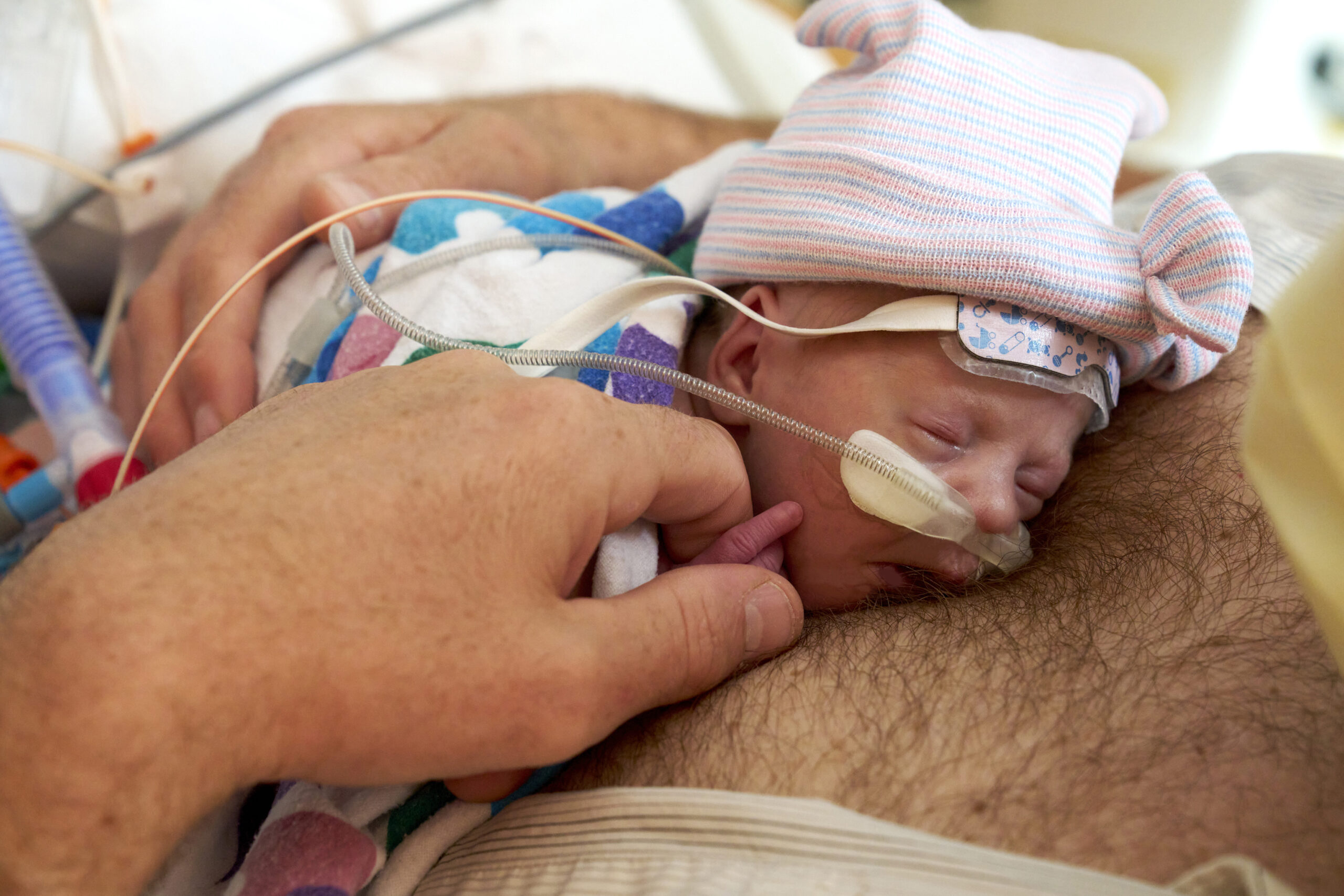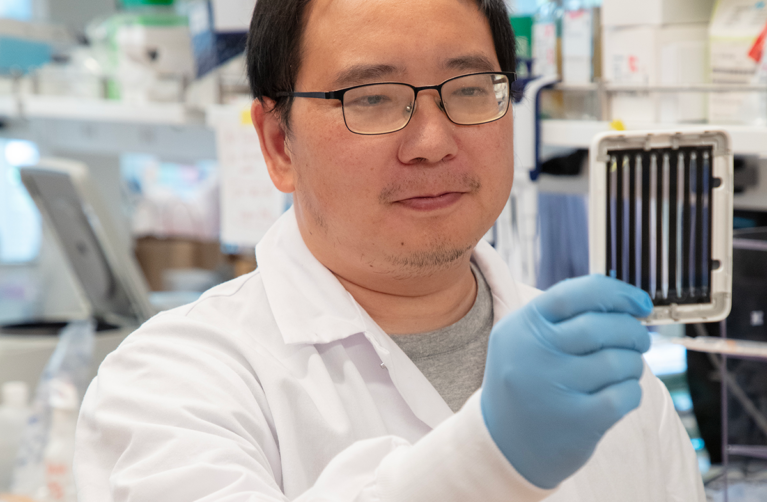Collette’s pregnancy was going really well.
Then one morning, about 30 weeks along, she started feeling cramps. There was no bleeding or signs of big concern, but she stopped by her doctor’s office in Santa Cruz just to be safe.
“They started a pelvic exam, and the midwife said, ‘I don’t need that swab, because you’re 3 centimeters dilated, 90 percent effaced, and in premature labor,’” Collette recalls.
Collette’s labor lasted about 24 hours before baby Austen was born at Dominican Hospital. Weighing just 2.6 pounds, Austen was admitted to Dominican’s neonatal intensive care unit (NICU), which is staffed by a Stanford Medicine Children’s Health care team.
“She was having a lot of secretion when she was born, so they tried to put a gastro tube in to help with clearing that, but the tube kept stopping,” Collette says. “The neonatologist, Dr. McNamara, told us Austen had a tracheal esophageal fistula, and we should get her to Packard Children’s Hospital because she needed surgery.”
A Packard Children’s Critical Care Transport team arrived to take Austen by ambulance from Santa Cruz to Palo Alto. Collette’s husband, Alex, followed the ambulance while Collette, still recovering from the delivery, was discharged that afternoon and joined them at the hospital.
“It was actually really wonderful when I arrived at the Packard Children’s NICU,” Collette says. “The nurses said, ‘Hi, mom! Sit down, we can get you doing skin-to-skin.’ And I was so wildly surprised because Austen was intubated, she was hooked up to so many things. She was so tiny. They worked for 10 or 15 minutes to get us situated and all the things hooked up safely, and I got to hold her. It was the first time I had gotten to hold her since she was born, so that was a really, really special moment.”
NICU social worker Emily Perez, MSW, LCSW, met with Collette and Alex to secure a space for them to sleep in the hospital.
More Shocking News
“When we came in the next morning, Austen had an echocardiogram to check out her heart,” Collette remembers. “And that’s when they said, ‘Oh, she has Tetralogy of Fallot, pulmonary atresia. But you already knew that.’”
But no, the family did not know that in addition to her tracheal esophageal fistula, Austen also had a very serious heart condition.
“It was 72 hours of bad news,” Alex says. “Monday morning: premature labor. Tuesday afternoon: tracheal esophageal fistula. Wednesday morning: Tetralogy of Fallot. Thursday: surgery to close the fistula and connect her esophagus. It was just wave after wave of news crashing over our heads, which is rough.”
“But I’ll say, with all of that, I was feeling so incredibly supported by everyone here at Stanford,” Collette adds. “They answered all the questions and did so in a way that didn’t feel condescending at all. It really did encompass the whole ‘treat the family, not just the symptoms’ mentality.”
Social worker Emily provided Alex and Collette with mental health support to process everything they were facing, and nurses brought Collette whatever postpartum care supplies she needed.
Alex remembers, “They asked Collette, ‘What do you need?’ and we said, ‘Oh, she’s not a patient here.’ But the nurse said, ‘No, we treat the entire family.’ I’ve used this phrase a bunch of times, but I feel like everybody here is aggressively family-centric.”
With Austen’s dramatic entrance into the world, Alex and Collette have had to learn a lot about the medical field and caring for a critically ill newborn. But they credit their care team, which includes members from cardiothoracic and general surgery, neonatology, nutrition, respiratory therapy, and more, with rallying around them with support from all sides.
“One of the great things about being here is that everybody takes the time to explain things,” Alex says. “They really do a good job of figuring out where you’re at—what your level of understanding is—and threading the needle between not using too much jargon and not talking down to you.”
He appreciated how much time the doctors took to track Austen’s case and recalls bumping into a physician in the hallway who had been involved in Austen’s care early on. The doctor asked how she was doing. “I said, ‘It’s good, she’s getting bigger!’ and he said, ‘I know! 2.2 kilos today!’”
Austen’s Extraordinary Care
Austen’s esophageal challenges have been solved, and she underwent her first open-heart surgery in November. Her cardiothoracic surgeon, Elisabeth Martin, MD, said that babies as small as Austen are at high risk during surgery because their brain is still immature.
“The multidisciplinary neonatal team at Packard Children’s includes neonatologists, cardiologists, intensivists, and surgeons,” explains Dr. Martin. “We worked together to support Austen to become a very good surgical candidate for Tetralogy of Fallot repair. She ended up spending more time in the hospital prior to surgery than after. Her postoperative recovery was overall uneventful, and this is most definitely because she was well supported prior to undergoing cardiac surgery.”
Throughout this medical journey, Alex and Collette have found the hospital to be a source of comfort.
“The other day we were sitting here, and the morning light was coming through the window,” Alex says. “We had one of our primary nurses with us, and Austen was sleeping on my chest. We were doing a crossword puzzle and occasionally the nurse would help us out with a word. I was thinking, ‘This is actually just pleasant. This is just a nice day.’ There is lots of natural light and greenery and artwork, and a team of people who express real interest. You’re not just a patient, a number, but it’s a person and a family.”
As a child born with congenital heart disease, Austen will be a member of the Packard Children’s community for years to come.
“Dr. Martin told us, ‘She has bought a lifetime membership to the cardiology club,’” Collette says.
The plan is for Austen to receive care and surgeries over the years to ensure her heart is able to support her growing body.
In the meantime, the family hopes that medical research will find even more solutions and treatments that aren’t as invasive as multiple surgeries.
“We’ve opted into two different studies for treating her conditions,” Alex says. “One was a genetic study, and one is a postoperative study for her esophageal repair. We signed up for these because we know that the care she is getting today is so amazing because other people in the past have opted into studies. We want to make sure we are continuing the march of medical science forward.”
Looking Back on a Difficult—and Beautiful—Time
When reflecting on their time at Packard Children’s, Collette says that she hopes that others realize how nuanced each patient’s experience is. “Having specialists and teams of people that understand that is vitally important to the families.”
The memory of Austen sleeping on his chest and a quiet game of crossword puzzles sticks out to Alex, and he doesn’t take it for granted at all.
“From the physicians, to nurse practitioners, to nurses, to occupational therapists, to respiratory therapists, to psychologists, everybody here fights incredibly hard to carve out moments like that. Five years from now, 10 years from now, 50 years from now, those memories of when everyone here worked so hard to carve out a beautiful moment as a little young family, those are the moments I will cling to when I remember what had been a very scary experience. At Packard Children’s Hospital, they fought hard to make sure we felt like a family, even when we were going through something so hard.”
Tiny Austen will make her Summer Scamper debut this year. We hope you’ll cheer her on as she and her family take the stage to help count down the start of our 5k walk/run!
Your donations through Summer Scamper give families facing a devastating diagnosis access to extraordinary care teams. Thank you!



